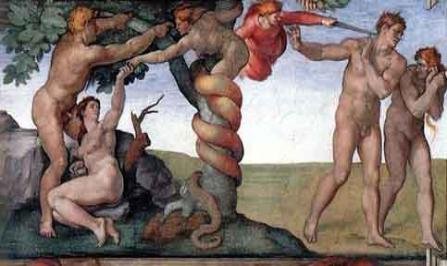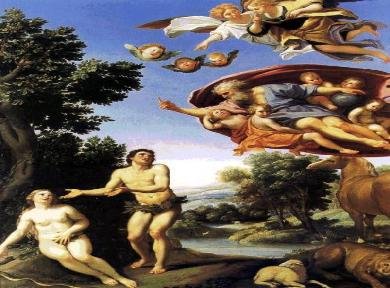What really happened in the garden?
Another common story: Adam and Eve were created, and placed in the
Garden of Eden. The only command they were given was not to eat the
fruit of one tree. Eve meets a serpent, and it convinces her to eat this fruit.
This causes God to punish them, and banish the both of them from
paradise, forever.
In probably one of the most popular stories in our history, we are again led
by what most of us have always assumed. As in the previous Gap Theory
of Creation section, we are to read from verses which, originally, were
written in Hebrew. The people who translated this section of Genesis were
probably taught the same story as we see above; and they probably used
corresponding English words which would have best fit their assumptions.
As we delve into the original Hebrew, however, as well as other related
ancient texts associated, we might begin to see the possibility of other
elements to this story emerging. What if there was a little more to the
conversation between the Serpent and Eve? Could there have been some
elements to this story that were left out?
Often, obscure details of the Biblical narrative are not explained, for
whatever reason. There may have been something left out of this story
which was so dramatic that it's almost not fathomable.
First off: the serpent speaks. Many, over the years, might have wondered
why Eve wasn't more surprised that an animal decided to go and talk to
her! As we dig deeper, however, the answer might become clear. The
Serpent, at least in the past, may have not been the same type of creature
we picture today. It might not even have been an animal; but a humanoid-
looking being. In fact, there is a great deal of ancient written evidence
which suggests this Serpent was actually a serpentine, or serpent-like,
angel; one who previously fell from grace.[1]
As mentioned in the Giants of Scripture section, there were angels
fashioned around this same time as the above creation of Adam, to help
him out in his daily garden chores. We get a hint of this in the Bible:
And again, when He (God) bringeth in the firstbegotten into the world,
He saith, And let all the angels of God worship him.
- Heb. 1:6 (KJV)
It seems there, at least, was some in his vicinity. According to ancient
accounts, when some of these angels discovered how much preferential
treatment God had given to the man, these angels complained.[2] We may,
in the Bible, get a hint to the conversation between these angels and the
Almighty, in regards to their dissatisfaction of Adam:
Psa. 8:
4 What is man, that thou art mindful of him? and the son of man, that
thou visitest him?
5 For thou hast made him a little lower than the angels, and has crowned
him with glory and honor.
6 Thou madest him to have dominion of the works of thy hands...
God, however, would not put up with a lot of their dissension, and
eventually would cause them to fall - losing their heavenly positions, as well
as further being made submissive to Adam.
There was a huge garden of which God desired man to work in, and
maintain. This, of course, was the Garden of Eden; and Adam was
designated to be the "manager" of it (Gen. 2:5, 7-8). One ancient source,
The Book of the Cave of Treasures, stated that, "in it (the Garden of Eden)
dwelt the souls of the righteous. The souls of sinners dwelt in a deep place,
outside Eden."[3]
It has been said that at least two groups of angels might have been punished
for this disobedience, and cast down to earth (with Satan possibly being
among them).[4] Other ancient written evidence shows that there could
have even been other human beings on the earth at this time, beyond just
Adam and Eve; also designated to help work the fields in and around the
Garden, as well as help in the domestication of near-by animals (we read
more about this in 'Birds' and 'Beasts').[5]
Some of these fallen angels may have been designated to work outside of
the garden; some inside; most assigned various roles of leadership over the
human workers around them. But, regardless of their authority on the
earth, all of these fallen angels were still under the ultimate authority of that
one man: Adam.
Many of these terrestrial angels, since their fall, assumed a form which
looked like any man around them; complete with the same hands, feet, and
overall body shape of a human being. They lived on the earth just like
everyone else, with just a couple of differences. They could have still
maintained their "shining" appearance, as one might picture a typical angel
to have.[6]
Satan, as mentioned before, could have also been one of those who
complained to God, and fell this same way. Unlike some of those other
angels, who had dropped to earth and were able to take on a human-like
form, Satan was purely a spiritual angel. He did not fall in the same way.
If he was to make any change on the earth, he had to find a body to
possess - to be able to act like a human being. And that's just what he did...
According to a variety of ancient sources, Satan was one of the angels most
adamant about wanting Adam out of this position of power; and wanted to
convince other fellow angels to attempt an overthrow. The Serpent - one of
these other fallen angels - volunteered his services. Their target? To seduce
Eve.
Together, Satan and the Serpent wanted to cause her to disobey that one
and only law they had: not to eat of the fruit of the Tree of the Knowledge
of Good and Evil:
...(Satan) told the serpent, "I hear that you are wiser (than all the other
animals (or people?)... for Adam gives food to all the animals, thus
also to you. When then all the animals come to bow down before
Adam... you also come to bow down. You were created before him...
and you bow down before this little one! And why do you eat (food)
inferior to Adam's and his spouse's and not the food of paradise? But
come and harken to me so that we may have Adam expelled from the
wall of paradise just as we are on the outside... Be a sheath for me and
I will speak to the woman through your mouth a word by which we will
trick them." - Book of Adam [44]16.3a-16.4
Satan, then, was allowed to possess the serpent, to aid him in doing his
bidding. If they collectively could make Adam and Eve sin, they felt they
could get out of their new, subservient positions! As we see from the
above, a deal seemed to be in the works.
And why would this particular angel - the Serpent - want to help Satan?
There seemed to be one more benefit: the serpent seemed interested in:
maybe, with Adam overthrown, he could get one of the richest and most
luscious "fruits" in the garden: Eve herself.
Satan knew the serpent was now flesh and blood, and had thoughts and
desires similar to a human being. There may have also been some curiosity
about the sexual experience inside of this Serpent's mind, as well. We
know, according to the Bible, that angels can make themselves appear to
be human. They can eat, sleep, and otherwise live like any other human
being. They are no longer in the heavenly realm; why can't these fallen
angels also contemplate this side of human existence? If this was the case,
a good number of ancient sources tell us that Satan utilized these thoughts
of the Serpent to his advantage.[7]
The Serpent met Eve. Through him, Satan whispered his lies to Eve;
suggesting that she believe all of what he was saying. Even though she
initially didn't want to eat the fruit, the words coming out of the Serpent's
mouth were almost too much for her to negate. They, together, were very
seductive.
Beyond these words; beyond trickery and charm, Satan and the Serpent
may have had one more "ace up their sleeve." They may have had
something else in store for this woman - to cement their seduction: sexual
seduction!
A good number of ancient written texts allude to this. As one ancient
source stated: the serpent was inflamed by Eve - which means she could
have been made red or embarrassed throughout their sexual conversation.
[8]
The Bible, as well states, that Serpent beguiled Eve (Gen. 3:13). The word
"beguile" can also mean "wholly seduced." Did the serpent wholly seduce
Eve to eat the forbidden fruit - first with words, then with actual, physical
seduction?[9]
Even though the Bible doesn't specifically state it, that doesn't mean
something else couldn't have occurring at the same time. On top of it all, if
she was also seduced in this way, then naturally she may have been able to
use these same techniques on Adam; which, according to many, is how it
all went down!
Both, it seems, succumbed to temptation; whatever this "temptation" might
have been. And they both would also eat of the fruit of that Tree of
Knowledge - the one tree they were not permitted to do so. They
ultimately disobeyed God; their world became defiled; and their own fall
had begun.
After this, the Bible says that Adam and Eve now felt ashamed, and took
fig leaves to cover their private parts (Gen. 3:7). Now why would they
rush to cover these? Was this, maybe, a reflection of something they did
with them?
This whole idea of sexual seduction is not new. In fact, there is quite a bit
of ancient evidence which supports this.
According to the Bible (and other sources), the Serpent had other names:
among them Nachash and Azazel.[10] Azazel, before his own fall, was
considered to be the strong one of God: one of the strongest angels of the
heavens.[11] Yet, when he complained about Adam, he was reduced to
just an ordinary overseer of an earthly garden.
Yet, now: everything had changed. Satan and the fallen Serpent claimed
victory. They swooped the entire authority of Adam out from under him.
Adam and Eve had truly fallen, apart from their God - physically and
spiritually.
What about these affairs? Could the unthinkable also have happened?
What if there was something resulting from this sexual union between Eve
and the Serpent? There are a variety of sources, even the Bible, that might
point to an offspring coming from this sexual exchange!
When God punished Eve for her sin, it's interesting to note how many of
her punishments revolved around sexuality, childbirth, and motherhood.
Why? Could these be something directly reflected to the seduction they
were engulfed in?
For more on this, see Cain, Seed of the Serpent. There is a lot more on this
in the upcoming book The Rise of Mystery Babylon, as well.
Footnotes:
[1] Andrew Collins, From the Ashes of Angels (Rochester, Vermont: Bear & Company, 1996),
59.
[2] The Chronicles of Jerahmeel (The Hebrew Bible Historiale), 22:1, trans. M. Gaster, Ph. D.
(London: The Royal Asiatic Society, 1899), 46.
[3] The Book of the Cave of Treasures, The First Thousand Years, The Making of Eve (notes),
trans. Sir E. A. Wallis Budge (London: The Religious Tract Society, 1927), 61.
[4] Andrew Collins, From the Ashes of Angels (Rochester, Vermont: Bear & Company, 1996),
69.
[5] The Book of the Generations of Adam, 1:3, 3:1, http://www.earth-history.
com/Pseudepigrapha/generations-adam.htm (accessed May 5, 2007).
[6] The Companion Bible, Appendix 19 (Grand Rapids, Michigan: Kregel Publications, 1990),
24-25.
[7] Greg Killian, The Days of Noah, 19-20, http://www.adamqadmon.com/nephilim/gkillian000
(accessed Dec. 6, 2000); James L. Kugel, Traditions of the Bible (Cambridge, Massachusetts:
Harvard University Press, 1998), 110.
[8] Armenian Apocrypha Relating to Adam and Eve, 9 (notes), trans. Michael E. Stone
(Leiden: E. J. Brill, 1996), 31.
[9] Bentley Layton, The Gnostic Scriptures, “Other “ Gnostic Teachings According to St.
Irenaeus (New York: Doubleday, 1995), 181; Rabbi Leo Jung, Ph. D., Fallen Angels in Jewish,
Christian and Mohammedan Literature (New York: KTAV Publishing House, 1974), 75-76;
Robert Graves and Raphael Patai, Hebrew Myths: The Book of Genesis (Garden City, New
York: Doubleday & Company, 1964), 85.
[10] The Apocalypse of Abraham, 23:11-12, translator unknown, http://www.pseudepigrapha.
com/pseudepigrapha/Apocalypse_of_Abraham.html (accessed Oct 5, 2006).
[11] Azazel and Atonement (No. 214), 32, http://www.adamqadmon.com/nephilim/huie003.
html (accessed Dec. 5, 2000).
Copyright 2010, Brett T., All Rights Reserved





